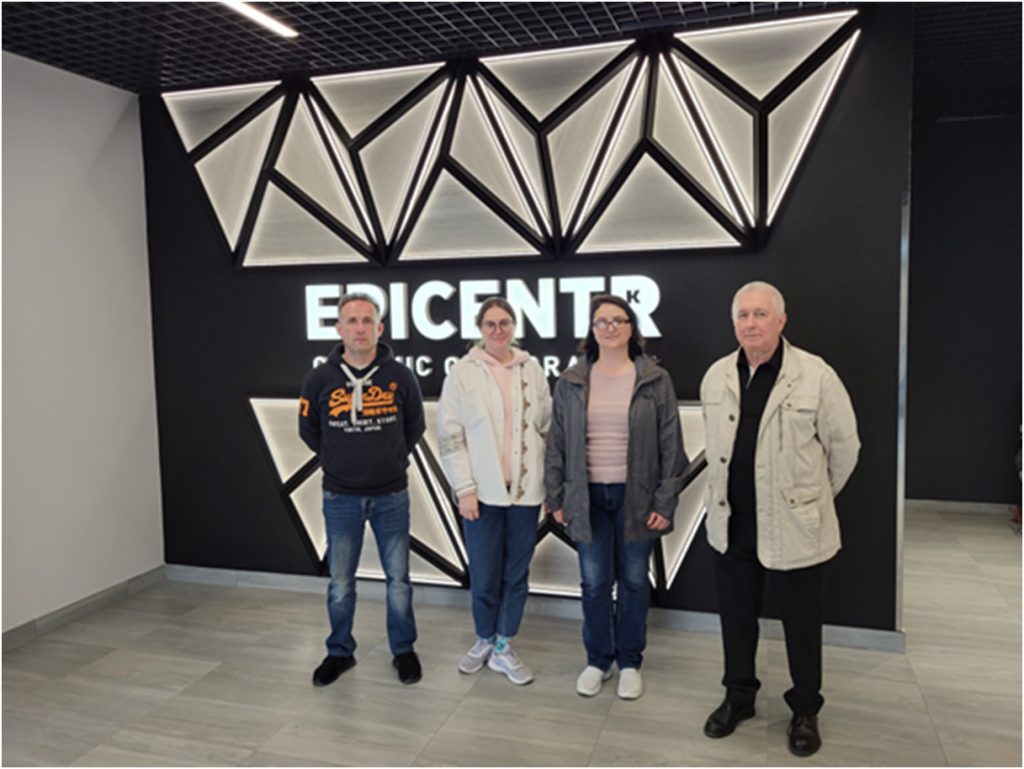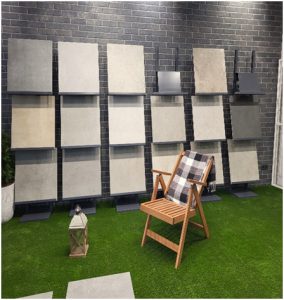On May 10, 2023, a group of employees of the Department of Chemical Technology of Ceramics and Glass – acting chief associate professor of the department, Ph.D. V.Yu. Tobilko, associate professor, Ph.D. V.M. Pavlenko, assistant A.I. Bondareva and leading engineer V.A. Makogon visited the ceramic tile production plant of Epicentr Ceramic Corporation, which is located in the village of Kalynivka, Fastiv district, Kyiv region.
The purpose of this visit is to get acquainted with the range of products, technology and equipment of the newest factory for the production of ceramic tiles and porcelain stoneware of the EPICENTER K group of companies and to discuss issues of cooperation in the training of specialists for personnel support of production.
The first stage of production with a capacity of 6 million m2 of tiles per year was put into operation in mid-2019, and by the end of 2021, the production capacity was planned at the level of 9 million m2 per year. During the next two years, it was planned to launch the 4th and 5th lines with a total volume of 15 million m2 of tiles per year.
The newest production facility with an area of over 70,000 m2 is equipped with high-tech equipment from the world leader in this field – the SACMI company, thanks to which Ukrainian ceramics can successfully compete with the world’s leading manufacturers and even exceed them in terms of product quality. It is assumed that 50% of the products will be exported to foreign markets, 50% will be sold in Ukraine, mostly in the parent network – Epicenter shopping centers.
It should be noted that thanks to the work of a highly qualified team of professionals and engineers, the latest production facilities were created on the basis of advanced equipment of the Italian manufacturers TM SACMI, SYSTEM and BMR, innovative production technologies were introduced, namely the digital color boost system – easy color boost, the technology of color rectification, the polishing line with the use of technologies – super shine and the quality control system of scanning – Qualitron and many other innovations.
The key to success is the following:
The use of domestic raw materials – the world’s best refractory clay and feldspar of own production;
High level of service – clear logistics and technical support of partners anywhere in the world;
Modern design – our own design studio develops new decors, reliefs and surfaces;
Quality control – covers the full cycle of production and control at all stages – from the extraction of raw materials to the delivery of finished products;
Highly qualified personnel.
During the meeting with the management of the plant, the main areas of cooperation were discussed. The acting director of the plant, Ruslan Valeryovich Khomenko, spoke about the current state and prospects for the development of production. He drew attention to the importance of providing production with qualified personnel, while noting the contribution of HTF graduates to the development of this enterprise, namely, chief technologist Leonid Demydchuk (graduate of the Department of Chemical Technology of Composite Materials) and Dmytro Smakal (graduate of the Department of Chemical Technology of Ceramics and Glass), who is currently in the ranks of the Armed Forces, and others, and also focused on the necessary training of ceramic specialists.
From the side of the department of HTKS, thanks were expressed for the opportunity to get acquainted with the capacities of the most modern enterprise for the production of ceramic products and the problems of training ceramic specialists were voiced, and first of all, the lack of opportunities for students to undergo industrial and pre-diploma practice and to get acquainted with modern equipment and technological solutions of production processes .
As a result of the discussion, a decision was made regarding the need for joint activities in the training of personnel for the ceramic industry by organizing excursions, production and pre-diploma internships for students in production, as well as involving the leading specialists of the plant in the educational process.



